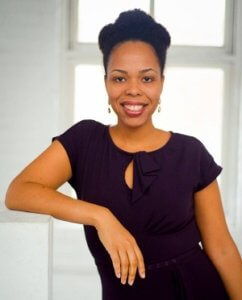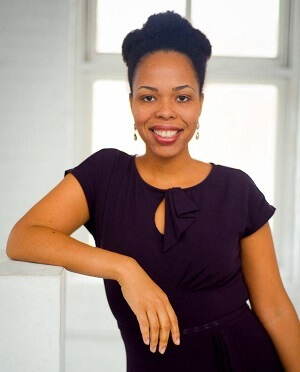An Interview with Elizabeth Whittaker-Walker, Raymond Whittaker Design
Elizabeth Whittaker-Walker reflects on her rich experiences at the intersection of policy and education and the lessons learned along the way on her journey to self-discovery, self-mastery, and co-creating a good world for us.
This interview is the twenty-ninth in our series, Black & Bold: Perspectives on Leadership.
Elizabeth Whittaker-Walker, Principal Consultant, Raymond Whittaker Design
Formerly Director of Learning Services and Public Policy, Council of Michigan Foundations
Focused. Insightful. Determined.
What are some of your career highlights?
Wow…career highlights. The opportunity to spend the beginning of my career in education as a teacher is definitely a highlight. I think  children are the greatest gifts and assets to the world; they are sacred. Being a school leader and having the opportunity to cultivate and nourish a culturally responsive environment for children and families was one of my greatest honors as well. (Elizabeth Whittaker-Walker pictured at right.)
children are the greatest gifts and assets to the world; they are sacred. Being a school leader and having the opportunity to cultivate and nourish a culturally responsive environment for children and families was one of my greatest honors as well. (Elizabeth Whittaker-Walker pictured at right.)
At Leadership for Educational Equity I helped leaders develop policy from an anti-oppressive lens. I’ve done some diplomacy work in Japan and West Africa. The opportunity to connect with leaders and peers outside of the Western gaze was good for my soul and good to have dialogue outside of that gaze. I’m also particularly proud that I designed a program that allowed leaders of color to come together and explore what allyship among communities of color could be in line with educational equity.
Another highlight is figuring out (it’s not past-tense since I haven’t completely figured it out yet, it’s in process) how to balance motherhood, being a wife, and having a demanding career.
If there was a headline for your leadership journey throughout your career, what would it be?
Throw some sage on it! (Laughter.) Hmm…leadership is about becoming, not something you ever arrive at. I’m constantly in a state of becoming and have always worked to become my best for us. My headline would be: a sister’s journey to self-discovery, self-mastery, and co-creating a good world for us.
What are your favorite types of challenges?
The types that allow me to be creative. The types of challenges where I have time and space to really think and wrap my head around the challenge. The types that allow me to connect great people to one another towards developing a solution. I love to think outside the box. What do you mean we are going to visit the Art Institute for this policy conversation about x? There might be something there that touches the mind or heart in a new way. I love to connect people to one another. A lot of times it’s challenging when I’m able to bring in multiple thought partners, but then the challenge becomes an opportunity that benefits the community or the collective.
What is one book that was meaningful or influential in your development as a leader?
All God’s Children Need Traveling Shoes by Maya Angelou was impactful because Maya Angelou talked about how a young woman took on the world. The Healers by Ayi Kwei Armah was compelling because it speaks about healing, which is what education and policy are about. Anyone who cares about making the world better is about healing. There’s one quote that sticks with me: “Our health and unity the same—to healers yes.” Absence of unity is when you have an absence of health; that’s happening in our nation and in our neighborhoods. I strive to be a healer.
Work in the social sector can be very personal and linked to one’s values. Can you think of a time when your values were in tension during your career and how you reconciled that tension or not?
When aren’t values in tension? There are systems that have privileged some and oppressed others. As a result, there are many communities that didn’t get access to resources that could help them support, build, or sustain their communities in ways that would have possibly eliminated the need for philanthropy.
Summer 2017, Democratic Representative Maxine Waters coined the phrase, “reclaiming my time,” as she thwarted Treasury Secretary Steven Mnuchin’s attempts to waste her time with nonsense. Can you share an experience in the workplace where you have had to reclaim your time? What was the context? How did you navigate it? What was the outcome?
There are certain hours of the day that I won’t take calls because that time is for my family and for me. One can have the most amazing job in the world and it could be there one day and not there the next. You and your family, on the other hand, cannot be replaced. You are responsible for caring for self as long as you’re on Earth. When I take care of myself I am most productive in my work and also the best mom, wife, child of God, and the best version me. That’s one example of reclaiming my time: protecting my time. I do small things like work with my assistant to ensure that I only have a certain number of meetings per day, so I have time to think, imagine, dream, and process. I’m not perfect at protecting my time yet but have committed to doing it.
There was an instance several years ago when I was addressed in a disrespectful way. The person’s tone and language weren’t right. I don’t entertain those types of conversations. It doesn’t serve my work, purpose, community, or my God. I protect my time and energy. I protect my Black Girl Magic.
I block off the lunch window and make sure in the morning that I have time for prayer and meditation. I take days off from time to time. I take vacations and refuse to think of myself as a work horse, because I’m not. I read a recent Facebook post that said, “Please stop teaching your daughters that her worth is defined by how much pain she can endure.” I’m not about that life.
What’s your approach to self-care? Are there any rituals you use to survive and thrive?
I have a wonderful family at home. I spend time with them. I do my best to get regular massages and I have a great tea collection at home. I enjoy a cup of tea just about every evening.
I also have an amazing sister circle and host sister circles in my home from time to time just to come together with a group of women I trust, respect, and love. We get together and talk about life; we show up in yoga pants and sweats and no make-up. We bring dishes of food to share, play games, and pour into each other. Sharing dreams with each other and sharpening those dreams and visions is so powerful.
I try to get regular walks in throughout the week (my goal is 20 miles/week). I’m also committed to getting eight hours of sleep—I usually do.
What advice would you offer other Black women trying to develop or amplify their voice to become self-advocates?
Trust your inner voice. You spirit will never lie to you. Give yourself permission to live out your purpose. That quiet voice calling you to something, pay attention. A lot of times when we dismiss that small voice, life has a way of forcing us to sit down and confront what we are called to.
Surround yourself with amazing people. Build a good network of sisters, both personally and professionally. You want to have a group of professional peers and those friends with whom you can have those deep belly laughs.
Visit Africa. Visit the Diaspora. Go to a place where your Black womanhood is affirmed…where your kind of beauty is lauded and appreciated. Everything we see here in the media is the opposite. You need to have that space and experience.
If you could change the social sector in a way that would benefit, lift up, or affirm Black women, what would that change be?
Trust in our voice and lived experience. Believe us when we tell you something.
Demonstrate greater respect for our time. The emotional labor that Black women are expected to bear (i.e. telling your story for the fiftieth time about how you dealt with colorism in the fourth grade, so we can dissect it) is too much.
Show more respect for our brand of leadership. Not to homogenize the leadership of Black women, but how we move through a space based on the generational transfer of knowledge and culture is unique. Change the ‘norms’ of leadership.
Consider a four-day work week. This offers more flexibility for self-care and recharging. Too often we are treated as work horses since we are good at what we do, and we care, and then we burn out because nobody was caring about us the way we are caring about others.
Don’t be threatened by our desire to commune. If people are requesting a resource group, it’s not about isolation or lack of inclusion. It’s often about survival, and sometimes we need those spaces where we can just be and exist. A strong practice around inclusivity can go a long way.



Comment section